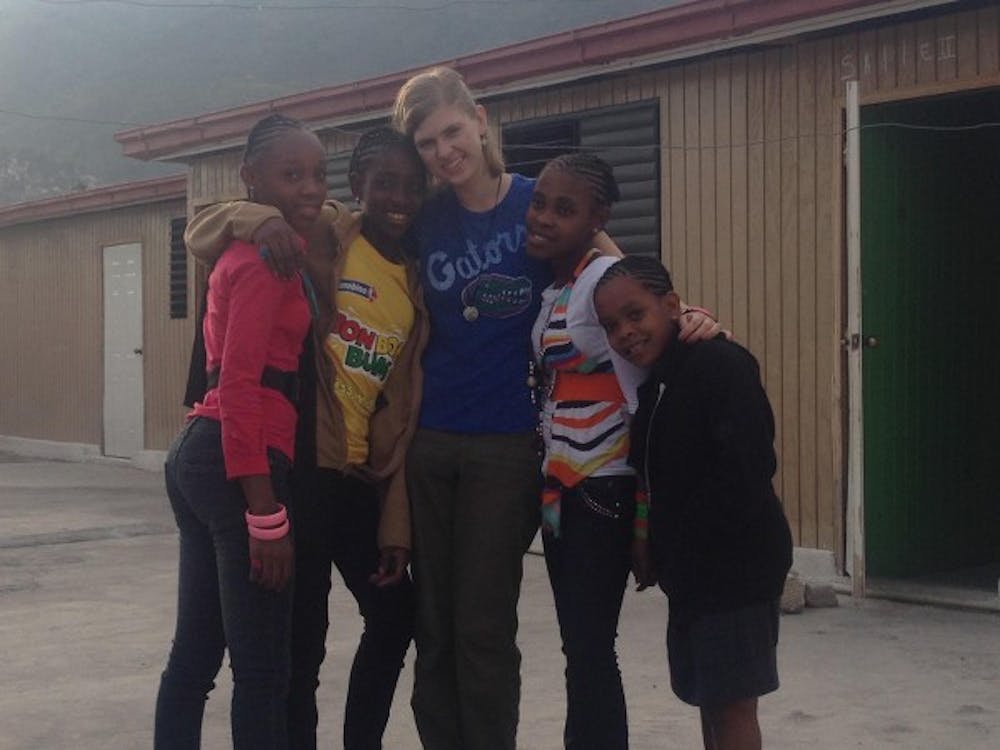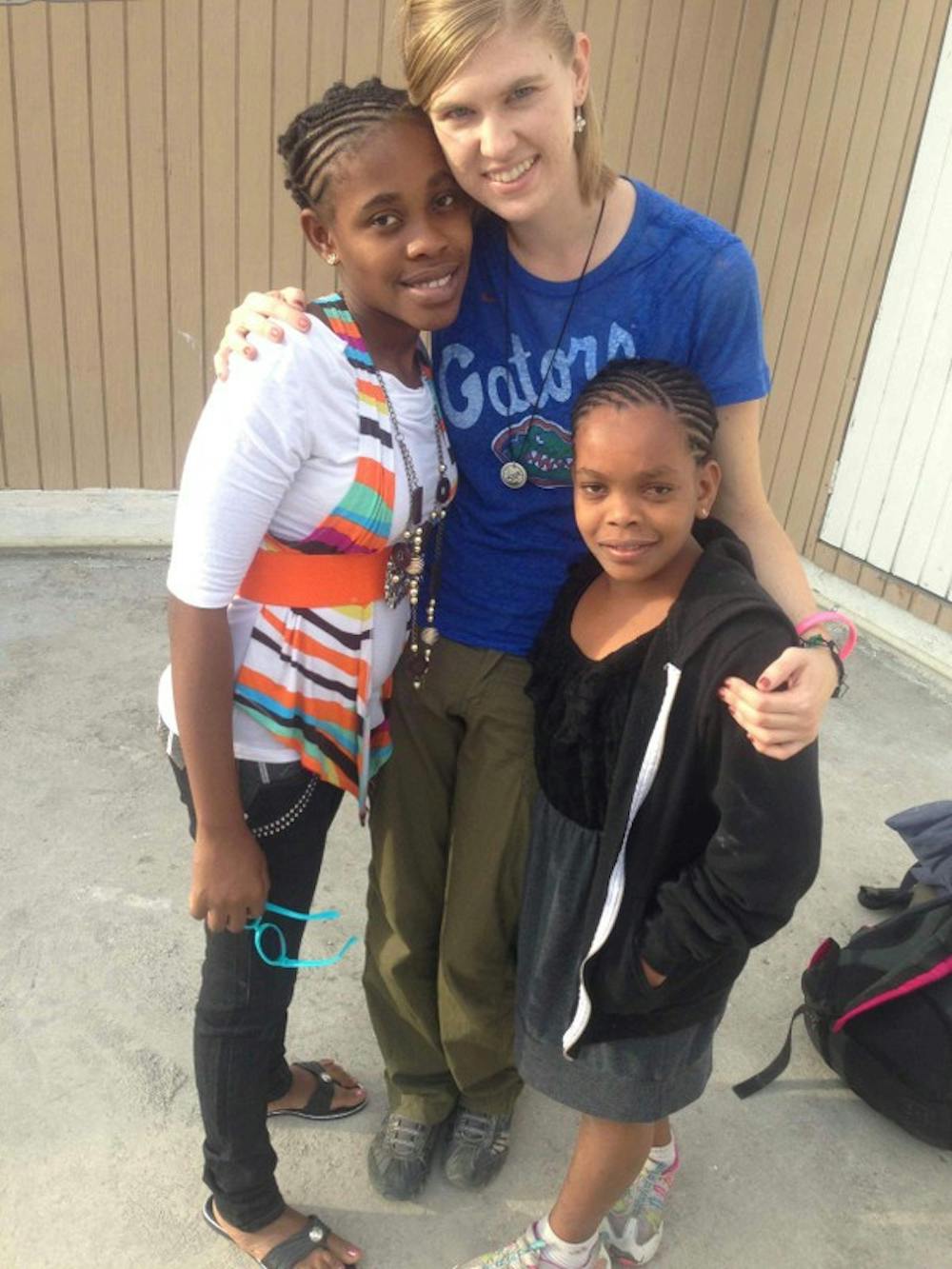By Elizabeth Syson | Echo

"One night . . . three of the girls came in, they locked the door, and they started telling me everything they had experienced," Julie Hedberg, a 2012 Taylor graduate, said. In those next moments, her image of a thriving orphanage was shattered.
When Hedberg started a humanitarian aid program for an orphanage in Haiti, she thought her plans were perfect. She had grown up traveling to orphanages with her mother, who is the executive director of a Christian adoption agency called Celebrate Children International. She graduated in 2012 from Taylor with a bachelor's degree in social work and had been hired by Celebrate Children International to serve underprivileged children around the world.
In May 2013, Ezequiel, the pastor in charge of El Jardin de Eden (the Garden of Eden) orphanage in Haiti, approached Celebrate Children International with a request for help promoting the orphanage and raising sponsors for the children. That July, Hedberg visited the orphanage planning to make a one-time visit, snap some photos and set up a website to attract sponsors. When she saw that the orphanage needed more help than expected, Hedberg got permission to start the humanitarian aid program.
Hedberg thought the program worked perfectly. Ezequiel is Cuban, so he and Hedberg could converse in Spanish-her second language, learned while living as a missionary kid in Venezuela. The orphanage welcomed her, and she felt a strong connection with the teenage girls living there.
"It was a God thing," she said.
However, six months later, in a classroom with three of those girls, she would learn just how desperate they were for outside help.
In December 2013, Hedberg planned another trip to the orphanage, hoping to spend Christmas with the children. Her plans fell through.
"Every time I tried to make a plan, God would change it," she said. She put off her trip until January, when she was able to spend a week at the orphanage. That week Ezequiel was away from the orphanage, and the teenage girls Hedberg had befriended in July approached her one night with the story of their abuse.
"When I asked them at the end, 'Who else knows about this?' They said, 'You're the first person we've trusted to actually tell all of this. You're the first person who's come back and actually cared about us.'"
The girls told Hedberg that the orphanage had only one caretaker, though staff claimed there were eight. In place of hired caretakers, four of the girls-Sandra, 18, Jonissa, 16, Fedna, 14, and Medjina, 13-were forced to cook, clean and look after younger children.
"If they didn't work fast enough, they would be whipped and beaten, all under the guise of punishment, to make them stronger people," Hedberg said.
Ezequiel, though not an active participant in this abuse, covered it up, according to Hedberg.
The next day, the orphanage staff learned that the girls had spoken of their abuse. They threatened the girls with worse beatings and expulsion from the orphanage. Hedberg consulted with Dr. Bernard, another orphanage director and lawyer who runs Hope for the Children of Haiti. During the remainder of the week they threw themselves into a rescue mission, finding a way to legally transfer the girls to Dr. Bernard's orphanage.
Though Hope for the Children of Haiti's orphanage was already at maximum capacity, they agreed to take the four girls. There they receive three meals a day, private tutoring to help them make up for the years of schooling they've missed, as well as college and help with job hunting if sponsorship continues.
"I believe that's far more than just helping kids survive," Hedberg said. "That's what sponsorship is-help a kid make ends meet, maybe go to school, maybe not-but I believe this is a way to help transform a generation."
This new orphanage costs $175 a month for each girl. Hedberg has been reaching out to churches, groups, and individuals to raise sponsorship to keep the girls in this orphanage. So far she has a quarter of the necessary payments. The rest she pays out of her own pocket.
Sadly, transferring these four girls is not the end of the story. Twenty-six children still live in an abusive situation at El Jardin de Eden. Abuse in orphanages is tragically common in Haiti, and orphanages in the country are so overcrowded that even if this one closed, there would be no place for the children to go.
"They have no opportunities," Hedberg explained. "One of the girls was rescued from sex trafficking, and I believe that's where she'd end up if she were back on the streets."
However, Hedberg is optimistic that the situation will be resolved, thanks to the girls' determination to advocate for the children left behind. Seeing their courage, former staff members from the orphanage have begun stepping forward to testify to the reality of the situation there.
Working with Eswa Berlancia, a women's rescue mission in Haiti, Hedberg hopes to buy a house where Eswa Berlancia's workers would take care of the 26 children left behind. The sooner she can find full sponsorship for the four girls, the sooner she will be able to put her funds and fundraising toward a house for the other children. Her fundraising efforts are progressing more slowly than she had hoped, but Hedberg remains faithful, and she has the joy of seeing Sandra, Jonissa, Fedna and Medjina in a healthy environment.



